MercoPress. South Atlantic News Agency
Tag: economy
-
Tuesday, October 2nd 2018 - 08:21 UTC
Argentine Peso rises 4% after central bank sells seven-day notes paying 72%
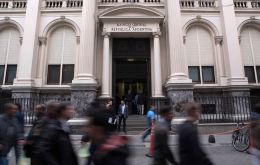
The he Argentine peso climbed more than 4% on Monday trading on the back of a debt sale by the central bank aimed at mopping up excess liquidity and signs that the International Monetary Fund (IMF) is solidly behind the administration of president Mauricio Macri.
-
Monday, October 1st 2018 - 08:14 UTC
Daunting Brazil challenges for whoever is elected president this month

Whoever wins Brazil’s presidential election on October 7, and the runoff on October 28, will have to convince markets, implement austerity measures while trying to drag millions people out of poverty.
-
Tuesday, September 25th 2018 - 21:35 UTC
Who is Guido Sandleris, Argentina's Central Bank president after the surprise resignation of Caputo

The resignation of Luis Caputo to the Presidency of the Central Bank of Argentina (BCRA), which has been reflected with surprise by the international media, occurs amid the trip of the Argentine President, Mauricio Macri, to New York to attend the Assembly General of the UN and with the mission of restoring the confidence of the international market in the Argentine economy. His predecessor, Guido Sandleris, receives a Central Bank when it is about to close an agreement with the International Monetary Fund (IMF).
-
Friday, September 21st 2018 - 08:35 UTC
US/Beijing trade war: China plans to reduce tariff rates on imports next October, reports Bloomberg
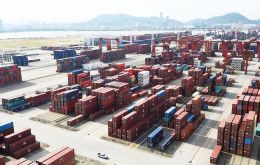
China plans to reduce the average tariff rate on imports from most of its trading partners as soon as October, Bloomberg News reported on Thursday. In July, China cut import tariffs on almost 1,500 consumer products ranging from cosmetics to home appliances as part of efforts to open up its economy, the world’s second biggest.
-
Thursday, September 20th 2018 - 08:37 UTC
Brazil leaves interest rates unchanged, as long as inflation remains in target range
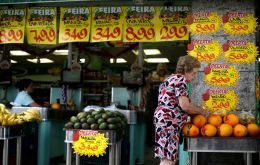
The Brazilian central bank on Wednesday held interest rates at an all-time low despite a currency selloff, as widely anticipated, but said it could “gradually” raise them in the future if inflation expectations spike.
-
Wednesday, September 19th 2018 - 08:18 UTC
Brazilian Bovespa market index up 1.75%; Real suffers a slight depreciation

Brazil's benchmark Bovespa index rose 1.75% on Tuesday, rallying for a second straight day largely on a spike in commodities prices. Two of the Bovespa's most heavily weighted equities, miner Vale and oil giant Petrobras benefited from rising commodity prices worldwide amid escalating China-U.S. trade tensions and signals OPEC is not prepared to raise output to address shrinking supplies from Iran.
-
Wednesday, September 19th 2018 - 08:11 UTC
China agreed to invest US$ 5bn in Venezuelan oil, alleges Maduro
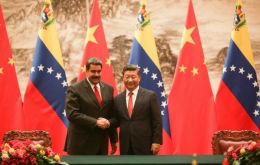
Venezuelan President Nicolas Maduro said on Tuesday that new investments from China will help his country dramatically boost its oil production, doubling down on financing from the Asian nation to turn around its crashing economy.
-
Monday, September 17th 2018 - 08:12 UTC
International support for Argentina's general strike against IMF austerity measures
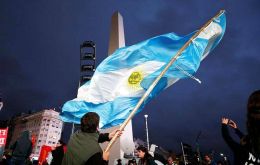
The International Trade Union Conference, ITUC’s affiliates in Argentina, CGT, CTA-A and CTA-T have announced a general strike for 24-25 September in opposition to expected sweeping austerity measures being developed by the government and the International Monetary Fund.
-
Friday, September 14th 2018 - 09:25 UTC
Brazil currency closed on Thursday at a record low on political uncertainty

Brazil's currency closed at a record low of 4.197 to the US dollar on Thursday amid uncertainty and unpredictability surrounding next month's presidential elections. The previous record of 4.166 dated back to January 2016, during a two-and-a-half-year recession.
-
Friday, September 14th 2018 - 08:22 UTC
Governor Carney warns of economic chaos and property crash in a no-deal Brexit

Bank of England governor Mark Carney has delivered a “chilling” warning to Theresa May’s cabinet that a no-deal Brexit could lead to economic chaos, including a property crash that could see house prices fall by a third.
